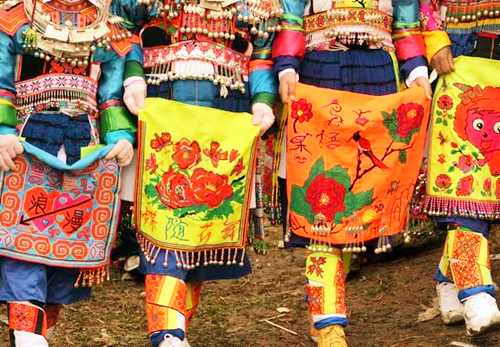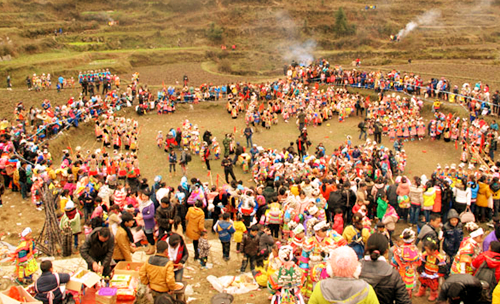The Miao minority in Guizhou, China has a unique custom of meeting the other half. One day before the Lantern Festival, young people from the group dance under the moon to seek their soulmate. Both young girls and boys are eager to put their best foot forward.
"Dancing Under the Moon" started with a Miao legend, where the Moon was a simple and honest young man who finally tied the knot with a beautiful woman despite many hardships. This dance celebrating the legend is held around the Lantern Festival or on the Mid-autumn festival when the moon is at its fullest and brightest.
You would think that "Dancing Under the Moon" would be held at night under the moon, but it has evolved into a whole day carnival for these young participants. By mid-day, the village yard is filled with young people. If a boy likes a girl in the dancing parade, he will walk near her and play his reed for her.

Nowadays Miao marriages are usually arranged by parents, but unmarried young men and women have the freedom to court. Mass courting occasions sometimes take place during holidays, when young women from a host village gather to sing antiphonal love songs with young men from neighboring villages.
In Chuxiong, Yunnan Province, the practice of setting up public courting houses for unmarried men and women prevailed until a few decades ago. After a day's work, they would visit these houses to sing, dance and court with their partners. The Miaos there also practiced the custom of "kidnapping brides." If the kidnapped girl consented to an offer of marriage, a grand wedding feast was held. If she did not, she was free to go.

With a population of more than seven million, the Miao people form one of the largest ethnic minorities in southwest China. They are mainly distributed across Guizhou, Yunnan, Hunan and Sichuan provinces and Guangxi Zhuang Autonomous Region, and a small number live on Hainan Island in Guangdong Province and in southwest Hubei Province. Most of them live in tightly-knit communities, with a few living in areas inhabited by several other ethnic groups.
